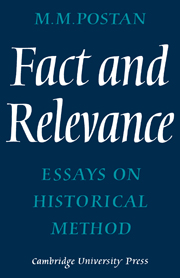Book contents
- Frontmatter
- Contents
- Acknowledgments
- Preface
- 1 Reason in social study
- 2 History and the social sciences
- 3 The historical method in social science
- 4 Function and dialectic in economic history
- 5 Fact and relevance in historical study
- 6 Economic and social history
- 7 Economic growth
- 8 A plague of economists?
- 9 The uses and abuses of economics
- 10 Agriculture and economic development: a lesson of history
- 11 Technological progress in post-war Europe
- 12 A study of history
- 13 Karl Marx: a democrat?
- 14 Hugh Gaitskell: political and intellectual progress
- Index
6 - Economic and social history
Published online by Cambridge University Press: 07 October 2011
- Frontmatter
- Contents
- Acknowledgments
- Preface
- 1 Reason in social study
- 2 History and the social sciences
- 3 The historical method in social science
- 4 Function and dialectic in economic history
- 5 Fact and relevance in historical study
- 6 Economic and social history
- 7 Economic growth
- 8 A plague of economists?
- 9 The uses and abuses of economics
- 10 Agriculture and economic development: a lesson of history
- 11 Technological progress in post-war Europe
- 12 A study of history
- 13 Karl Marx: a democrat?
- 14 Hugh Gaitskell: political and intellectual progress
- Index
Summary
The study of economic history is now a flourishing pursuit; flourishing even by the standards of our inflationary age. There are new chairs and readerships in almost every British university, lectureships and research studentships galore, a busy Economic History Society, a Review with a circulation larger than that of any other comparable historical journal here or abroad, and several specialized journals devoted to the history of transport, agriculture, technology. Above all, a stream of articles and books, both recondite and popular, has been flowing in great and rising volume.
The prosperity is due to many causes, some of which are obviously adventitious. If so much is now being done in the field of business history, and we are promised a whole library of books on the pattern of Mr Wilson's successful history of Unilever's, this is obviously due not only to the attractions of‘entrepreneurial’ problems, but also to the blandishments of a number of old and wealthy firms. Similarly, if the recent history of the engineering industry, of the armament industry, of shipping, of the distributive trades and–most important of all–of national incomes and outlays, has been subjected to detailed study, the credit for this belongs to official and corporate sponsors of every kind, and above all, to Her Majesty's Government and the National Institute of Social and Economic Research.
Among the extraneous advantages which the subject now enjoys, one must also reckon the support which it has been receiving from its fellow-travellers.
- Type
- Chapter
- Information
- Fact and RelevanceEssays on Historical Method, pp. 65 - 71Publisher: Cambridge University PressPrint publication year: 1971



